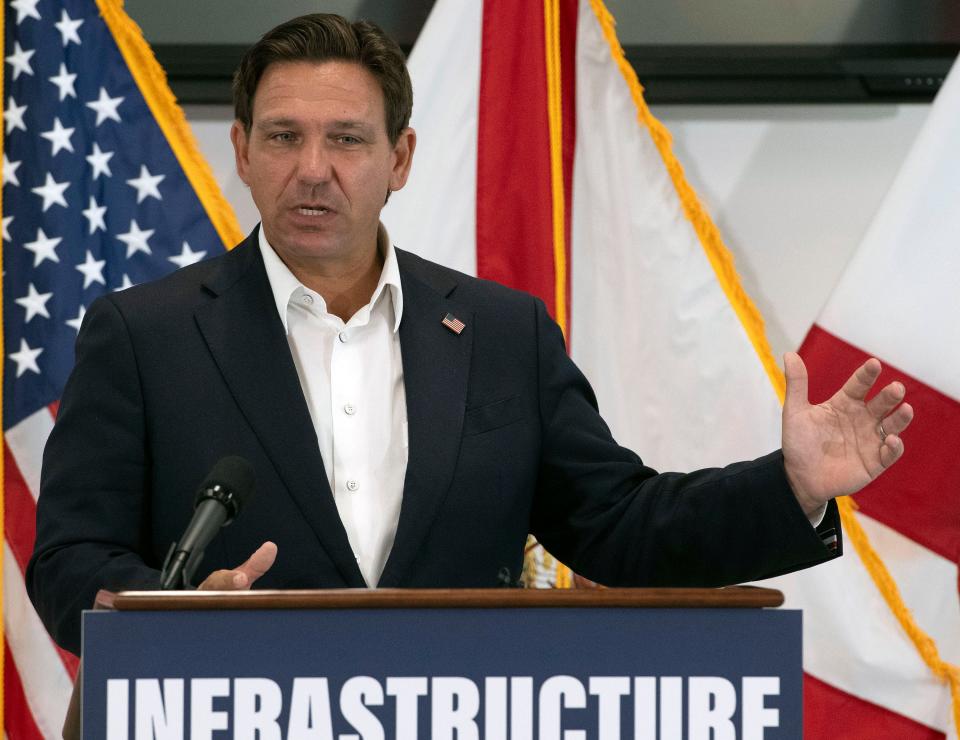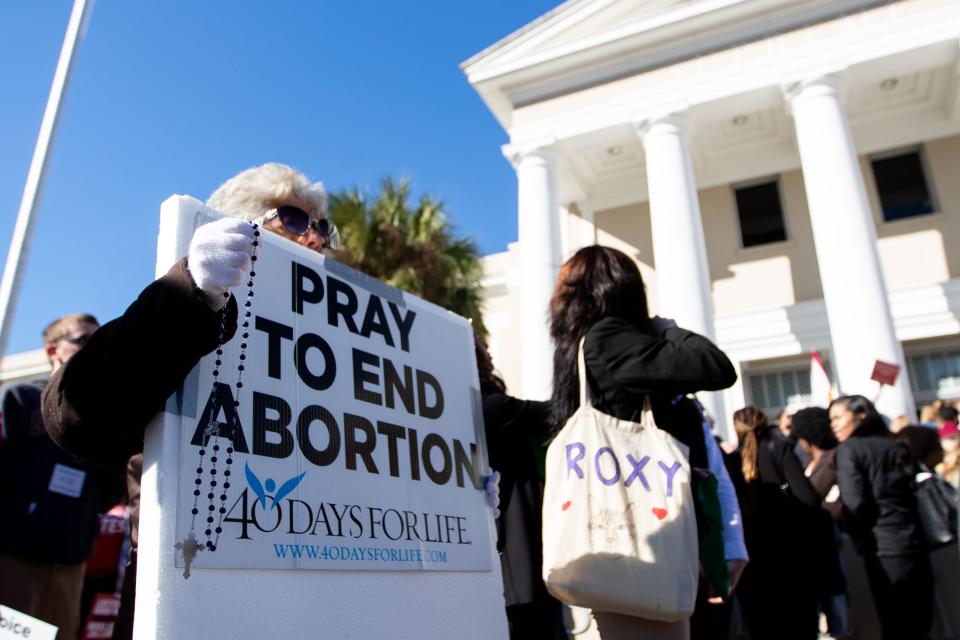DeSantis, Florida House pay outsiders to influence financial statement on abortion measure
- Oops!Something went wrong.Please try again later.
State officials are collectively paying anti-abortion advocates hundreds of dollars an hour to represent their interests on an obscure government panel in the battle over November's abortion ballot measure.
It's another loud-and-clear move that Gov. Ron DeSantis and Florida House of Representatives leadership are serious about defeating Amendment 4, the constitutional amendment aimed at ensuring abortion access in the state.
The Executive Office of the Governor is paying Michael New, an assistant professor of social research at the Busch School of Business at The Catholic University of America in Washington, D.C., $300 an hour, to speak at the state's Financial Impact Estimating Conference (FIEC) meetings.

And the Florida House of Representatives is paying Rachel Greszler, a senior research fellow with the Roe Institute at the conservative Heritage Foundation, also based in Washington, $75 an hour to represent the House, according to the Florida House's Office of Open Government and House spokesperson Jenna Box Sarkissian.
The panel, which met last week and Monday, determines the "fiscal impact statement" to be printed on ballots, which could potentially sway voters to keep Florida's Heartbeat Protection Act, a ban on abortions after six weeks, in effect.
The voting members, who will decide on the text of the statement, are Chris Spencer, once DeSantis' budget chief and now head of the State Board of Administration, on behalf of the governor; Greszler for the House; Senate Finance and Tax Committee Staff Director Azhar Khan, and Amy Baker, who heads the Florida Legislature's Office of Economic & Demographic Research (EDR).
DeSantis has called Amendment 4 "very, very extreme," and said the Florida Supreme Court "dropped the ball" allowing the measure on the ballot.
In June, the governor launched the "Florida Freedom Fund," a political spending committee aimed to defeat the abortion and marijuana ballot amendments and support candidates across the state. As of June 28, the committee had $121,000 in contributions.
Amendment 4, which needs at least 60% of the vote to pass, would negate the current restrictions signed into law by DeSantis. The ballot measure would allow abortions up to fetal viability, usually about 24 weeks of pregnancy.
That would restore a standard that was in place across the nation until the U.S. Supreme Court's 2022 Dobbs ruling that ended the constitutional right to abortion in the Roe v. Wade decision.

Spencer pushed the panel to include potential litigation costs if the amendment is passed, which would cost the state.
"We believe from the governor's office that it's inevitable that litigation is going to occur, and we need to account for that," Spencer said. EDR analysts do not usually include litigation in the fiscal impact analysis.
Spencer listed 20 state laws he believed would "probably" be contested in court, and said the fiscal impact would not only include the cost of the state defending the litigation but also the costs of potential state Medicaid coverage.
Spencer used Michigan as an example — abortion rights supporters are suing the state to overturn the ban on taxpayer-funded abortions after voters passed a constitutional amendment in 2022.
"We can't put a dollar figure how much the litigation is going to cost ... but I think it's something significant enough that it can't be ignored in a financial estimating impact analysis," Spencer said.
Greszler agreed and said other state courts have ruled for taxpayer-funded abortions. Khan, however, said some of those decisions were from the 1980s and '90s before the Dobbs decision that ended the constitutional right to abortion.
"I believe it will be litigated. I feel very comfortable saying that given the history in other states," he said. "But I'm very uncomfortable saying what a judicial outcome will be on this issue."
Later in the meeting, Greszler brought up fertility rates and demographic trends and their effects on the state's economy.
"I think it's intellectually dishonest to have an economic analysis that's only going to consider the short term," she said.

Khan said Greszler's argument that a larger population equals a larger economy does not account for Florida's tax structure.
"Folks, if you look at the past in-migration and out-migration trends in the state, we lose people when they finish high school and they finish college, and we gain them back when they get closer to their retirement. How do we account for that?" he said.
The meeting, which started at 9 a.m. Monday, continued into the afternoon, and was the second time the FIEC panel met to discuss the abortion amendment. The panel will meet again next week and is expected to decide what the financial impact statement will say on the ballot in November.
Baker said the panel can "agree to disagree" if they arrive at a 2-2 vote.
Ana Goñi-Lessan, state watchdog reporter for the USA TODAY Network – Florida, can be reached at agonilessan@gannett.com.
This article originally appeared on Tallahassee Democrat: DeSantis pays outsider to speak at FL abortion financial impact panel

